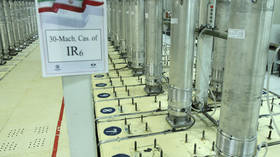Iran could ‘easily’ enrich uranium to 90 percent nuke level, but is studying ‘if there is a need’ – atomic energy agency

The Atomic Energy Organization of Iran (AEOI) has claimed the country could easily enrich uranium to the 90 percent weapons-grade level if needed. France, Germany and the UK this week objected to its 20 percent enrichment move.
“We have made so much progress that we can easily produce enriched uranium at any level, even beyond this [20-percent] purity level, up to 40 percent, 60 percent, and 90 percent,” spokesperson for the AEOI, Behrouz Kamalvandi, told reporters on Thursday.
He added that the AEOI is permitted to enrich uranium beyond 20 percent purity under a bill the Iranian parliament passed in December but added that the government was studying “if there is a need for it.”
On Wednesday the ‘E3 group’ of France, Germany and the UK jointly condemned Iran’s announcement it had started uranium enrichment to 20 percent, calling it a “clear violation” of the 2015 nuclear deal.
Also on rt.com As Joe Biden prepares to take power, Iran is ramping up pressure on the incoming president to revive the nuclear dealAEOI chief Ali Akbar Salehi said this week that scientists had started enrichment to 20 percent around 24 hours after informing the UN nuclear watchdog, the International Atomic Energy Agency.
The move takes Iran beyond the 4.5 percent level of uranium purity it previously achieved, which was a breach of the 2015 nuclear deal – also known as the Joint Comprehensive Plan of Action (JCPOA). The agreement provided sanctions relief for Iran as long as it promised not to enrich uranium beyond 3.67 percent purity and allowed international inspections to take place.
However, US President Donald Trump withdrew the US from the deal in 2018 while alleging Iran had breached the agreement, despite nuclear inspectors saying Tehran was adhering to its commitments.Washington has since continued with the so-called “maximum pressure” campaign of sanctions against Iran.
Tehran has in turn accused the European signatories to the deal of reneging on their pledges to protect Iran from the sting of US sanctions. The Iranian government has repeatedly said that its nuclear program is solely for peaceful purposes.
Like this story? Share it with a friend!














